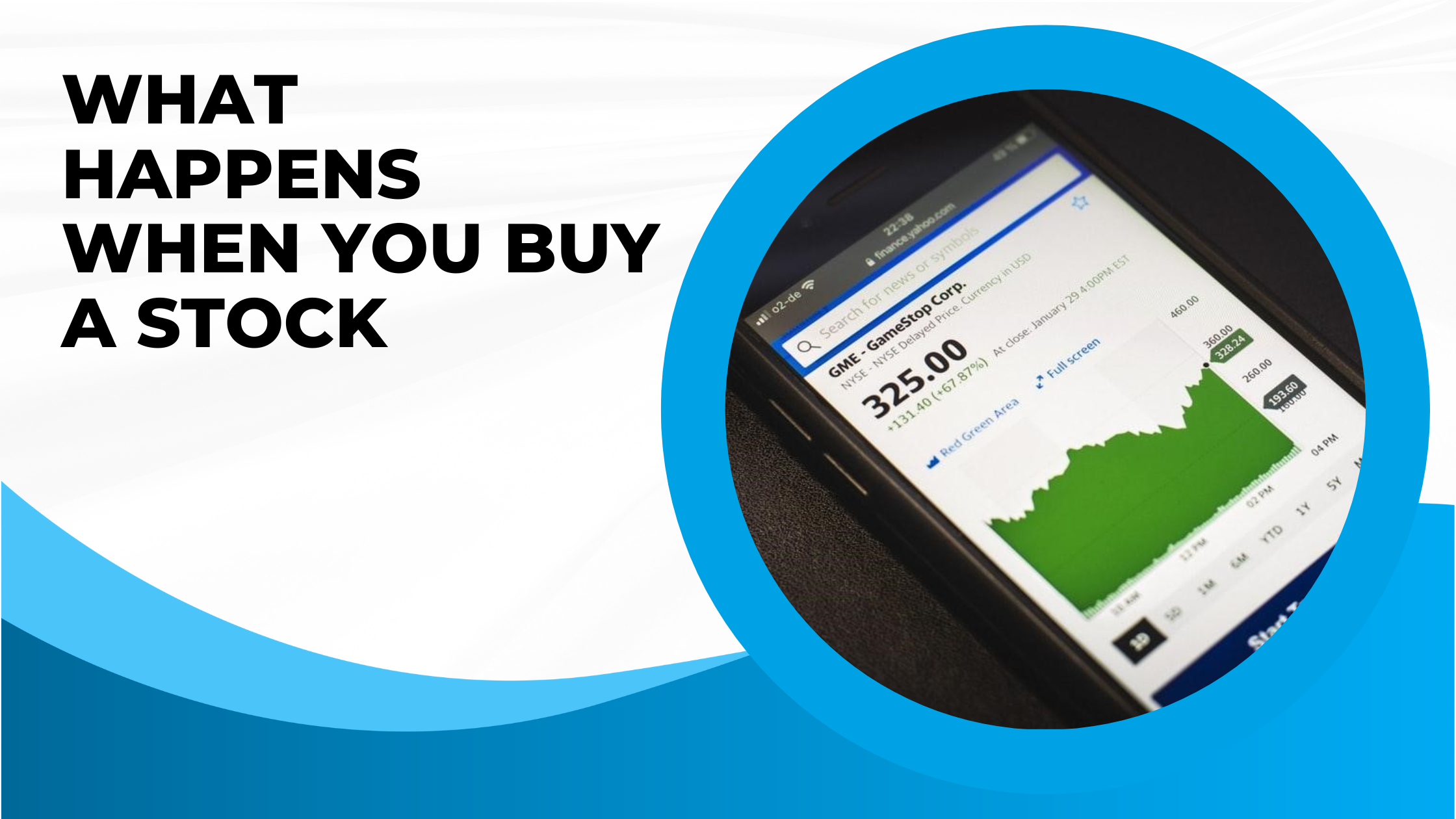When you buy a stock, you become the owner, meaning you have the right to claim the company’s assets and earnings.
If a company makes a profit, you also make a profit according to the amount corresponding to the share you invested.
The owner of one or more shares in a company is known as a shareholder.
Shares are traded on stock exchanges and over-the-counter markets and are a way to increase and accumulate assets and wealth.
Shareholders purchase shares through a brokerage account. A brokerage account is used to buy and sell securities such as stocks, bonds, and mutual funds.
You can either use a licensed representative working in the brokerage office or by using an electronic broker.
It is all quite simple, but how does it all happen, and what happens when you buy a stock?
Table of Contents
ToggleWhat Exactly Are Stocks in a Company?
A share of stock is part of a company’s ownership. Shares are represented as units of stock owned by a company.
Shares are divided into two types:
- Common stock
- Preferred stock
The main purpose for selling shares is to raise capital for financing different corporate operations and projects. The total value of a company is calculated by multiplying the number of shares by the value of each share. This results in market capitalization.
One of the most influential and common investment practices around the world is the purchase of shares.
What Happens When You Buy a Stock?

As mentioned above, once you buy a stock, you now own a fraction of the company, and the company can pay you a profit equivalent to the share you bought.
Most shares exist in electronic form, i.e., it is not something you can physically see or touch. There is no certificate that presents you as the owner of a share. Electronic shares are held in the broker’s system and credited to your account.
When you buy a stock, your investment remains in the account until you decide to sell or transfer the stock to another broker or another account.
Generally, people make profits by buying shares and selling them at a higher price. This buying and selling of shares is what directly impacts the value of the stock.
The more people sell a stock, the lower the purchase prices and vice versa.
What Are the Benefits of Buying a Stock?
The main motivation of a shareholder is to increase and obtain greater wealth. There are several benefits of acquiring shares in the stock market. It all depends on the company you decide to invest in, the duration of the investment period, and how much the investment capital amounts to.
In general, shareholders have the right to vote on a board of directors, elect an executive director, and even attend annual meetings to learn about the company’s progress.
In addition, being a shareholder of a company can provide the buyer with profits in a short period of time compared to other jobs.
Stocks can be bought and sold faster than other investments such as metals, bonds, or real estate. This means that investors can buy or sell stocks for cash.
Value of Stocks
The value of stocks can change from day to day. They can change from one minute to the next. Market forces are why stock prices fluctuate from one moment to the next.
When several people buy a company’s shares, the value of its shares increases because the demand is greater. Conversely, if many people want to sell stock more than they want to buy it, then the demand for the stock decreases, and its price decreases.
The buying and selling of company shares are done daily, which keeps the stock price moving. In addition, the confidence that investors have about the promising outlook of a company causes the demand for the stock to grow.
The investor owns the same number of shares as he bought, but each share’s value increases or decreases depending on the current value of the shares. Ideally, the value of the stock an investor buys should increase in value above the price at which it was purchased.
Share Size
The number of shares owned by an investor can change. For example, when a company declares a stock split or stock dividend, the person owning any shares of that same company will accumulate additional shares. This means that the number of shares owned by an investor may increase over time.
Getting dividends from stock is another way to generate profits by owning a stock. By declaring dividends from a company, the owner gets a share of the profits. Any dividends earned on an investor’s stock are reflected as cash in their account.

Stock Performance and How It Is Measured
The stock yield in the stock market is one of the most important concepts you need to understand if you want to buy shares in the stock market.
Of course, it’s all about stock dividends, but how are they calculated?
Several types of yields can be calculated by the investor himself or automatically through stock market sites. Here are some of the yields that can be calculated as gross yield, net or paid yield, and the yield on unit cost.
Gross Yield
The gross yield corresponds to the ratio between the amount of the gross dividend paid by the listed company divided by the share price. However, caution should be exercised as this rate of return does not consider the tax obligations of the owner of a share.
The gross rate of return on a share varies depending on the company’s stock market price when it is calculated. Therefore, when looking at the gross yield of a share, it is important to consider when and what value was considered to calculate it and the number of known dividends. This can be a bit complicated to understand. However, many stock sites give reliable gross yields based on past known dividends.
Net Yield
The net yield corresponds to the amount credited to the shareholder’s account divided by the share price. The net yield can be considered closer to the actual yield than the gross yield because the gross yield does not take into consideration additional expenses such as tax deductions and charges to the dividend.
Many people who invest in the stock market prefer to use the net yield value to compare the risk of the stock by considering the gross dividend calculation.
If a stock is held for more than five years, only the social security contributions should be deducted from the dividends when the capital is paid out.
The calculation is done differently when using a security account, as the yield paid considers the withholding taxes. The broker is responsible for making the tax deduction before paying the dividend.
In summary, the net yield of a stock is calculated based on the dividend from which taxes and other tax charges are deducted.
Transaction Cost
Another stock market concept that is important to know is the transaction cost of a stock.
Generally, people who buy stock usually do so through a brokerage service. A fee is charged when one of these services is used, known as the transaction cost.
In essence, the transaction cost is the price or commission paid to a broker to purchase shares. You can pay a fee for each transaction or pay a fee according to the transaction amount.
As you can see, investing in the stock market is not a casual endeavor. It takes patience and a lot of insight. When you understand all the concepts and strategies for investing, you are much more likely to make great profits and gains when you buy and sell a stock.
The best method of buying a stock is to know all the fundamentals of the company you want to invest in. In addition, various elements such as past stock value trends, achievements, and long-term prospects are useful in calculating the risk of buying or not buying a company’s stock.
Once a person becomes the owner of a company’s stock, a fraction of that company belongs to him. The more shares he owns, the more influence and participation he will have in the company’s profits.
If the price of the shares is going down, you must have the basic concepts and understand the market trend to be able to face that situation and know what actions to take.

